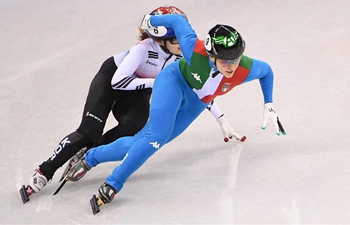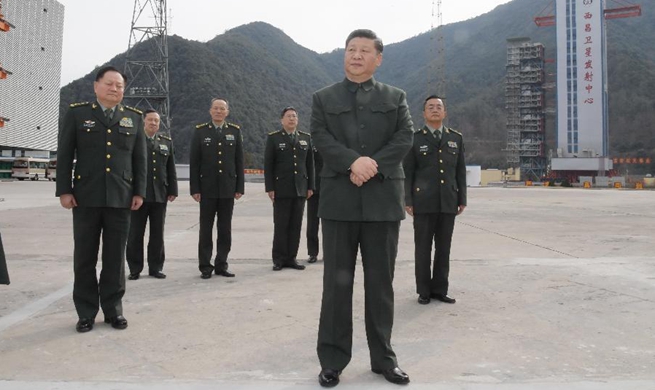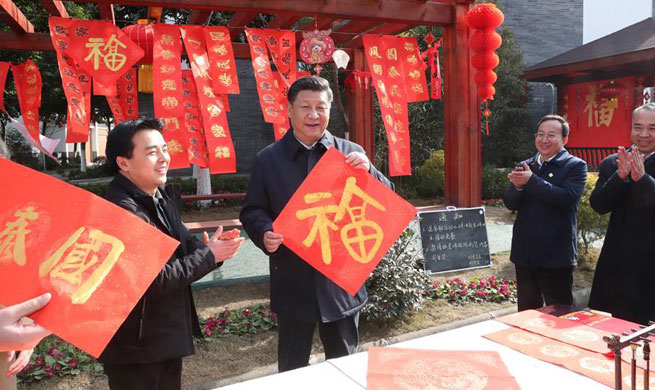BERLIN, Feb. 13 (Xinhua) -- An attempt to end bitter infighting among the German Social Democrats (SPD) with an immediate transfer of the leadership position from Martin Schulz to the current SPD parliamentary faction leader Andrea Nahles has met with resistance on Tuesday.
Regional SPD branches in Berlin, Schleswig-Holstein and Saxony-Anhalt all proposed that the party should instead be led by its parliamentary vice-presidents in the interim until Nahles is confirmed as leader at a party conference.
Several legal experts in the SPD joined this charge. "I am surprised that Andrea Nahles wants to take over the leadership immediately, if only in the interim," Harald Baumann-Hasske, Chairman of the Working Group Social Democratic Lawyers, told the newspaper "Welt".
"There is no constitutional basis for such a move in our statues," Baumann-Hasske noted, adding that it would hence be impossible for Nahles to make "significant decisions" including with regards to party finances.
PARTY STATUES
Earlier, senior SPD politicians, including Nahles, had suggested that it would be more sensible for the parliamentary faction leader to take immediate control by Tuesday. The plan to quell internal strife with a fast leadership reshuffle now seems to have had the opposite effect, however, with critics questioning the legal basis for Nahles' elevation to interim leader prior to her formal nomination by the party leadership committee.
Under the prevailing statues of the SPD, the party's parliamentary vice-presidents are designated to take charge in the vacant period between the departure of an old and inauguration of a new party leader.
Michael Mueller, head of the SPD in Berlin and mayor of the German capital, told the newspaper "Berliner Morgenpost" that he did not reject Nahles' candidacy for the leadership as such, but was in favor of a "clean process" as established by the party constitution.
Similarly, the SPD regional branch in Schleswig-Holstein urged the party leadership not to nominate Nahles as leader just yet. Instead, "a person from the rank of parliamentary vice-presidents should take over the office as indicated by our statues," a statement on behalf of the regional party cited by Welt read.
The SPD regional branches hereby endorsed an initiative launched by the SPD youth organization (Juso) which has emerged as one of the staunched critics of joining a new "grand coalition." Juso leader Kevin Kuehnert has expressed concerns that the SPD would be electorally marginalized during another term as junior partner to the Christian Democratic Union (CDU) and Christian Social Union (CSU), calling for the renewal of German social democracy in opposition.
OTHER VOICES
The situation was further complicated following an announcement on Monday night by Simone Lange (SPD), mayor of Flensburg, that she would mount her own candidacy against Nahles. German media cited a letter by Lange to the SPD leadership in which she called on the party to open itself up to a truly democratic debate over its future orientation.
The role of leader was "of far-reaching importance for the entire party and country and must not be determined internally by a small group," the SPD mayor argued. "I am advocating for a primary election and want to give our members a voice again and include them seriously in this decision-making process," Lange wrote in the letter.
As recently as Monday, SPD secretary general Lars Klingbeil reiterated a long-standing demand for a change in party statutes which would require a binding membership vote on the election of any leader rather than their selection by the party's elite leadership circle.
"We have decided at the party conference in December that we would examine the possibility of such a primary election," Klingbeil told "Redaktionsnetzwerk Deutschland" (RND).

















